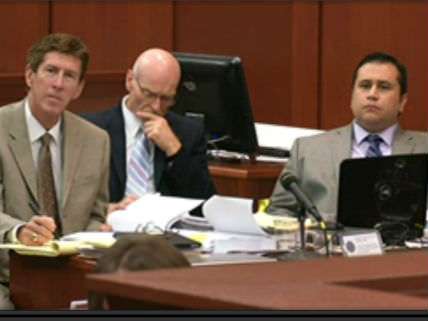The New York Times Says Florida's 'Stand Your Ground' Law Played 'Pivotal Role' in Zimmerman's Case

In a "news analysis," New York Times reporter Lizette Alvarez, who covered George Zimmerman's murder trial, tries to clarify what role Florida's "stand your ground" self-defense law did or did not play in the case:
Soon after Mr. Zimmerman was arrested, there appeared to be a chance that the defense would invoke a provision of Florida self-defense law known as Stand Your Ground. Ultimately it was not part of [defense attorney Mark] O'Mara's courtroom strategy, though it did play a pivotal role immediately after the shooting.
The provision, enacted by the Florida Legislature in 2005 and since adopted by more than 20 other states, allows people who fear great harm or death not to retreat, even if they can safely do so. If an attacker is retreating, people are still permitted to use deadly force.
The provision also allows a defendant claiming self-defense to seek civil and criminal immunity at a pretrial hearing.
Mr. O'Mara said he did not rely on Stand Your Ground as a defense because Mr. Zimmerman had no option to retreat. A pretrial immunity hearing, which prosecutors said they had been expecting, would only have divulged his case. So Mr. O'Mara gambled on a jury trial.
Alvarez neglects to mention that the fear justifying the use of deadly force must be reasonable given the circumstances, and I'm not sure where she sees permission to kill an attacker who is retreating. In fact, the statute says an aggressor may himself be justified in using force if he "withdraws from physical contact with the assailant [i.e., the person initially attacked] and indicates clearly to the assailant that [he] desires to withdraw and terminate the use of force, but the assailant continues or resumes the use of force." In any event, these are the ways in which the "stand your ground" law did not affect the outcome of Zimmerman's case. In what way was it "pivotal" right after the shooting? Here is Alvarez's explanation, for which she relies on University of Miami law professor Tamara Lave:
Under the law, if the police believe there is probable cause that someone acted in self-defense, as Mr. Zimmerman said he had, they are not allowed to make an arrest, [Lave] said.
Actually, the law says police need probable cause to believe a shooting was not justified before they can make an arrest. To charge Zimmerman, they needed reason to believe not only that he had killed Trayvon Martin (which he has always admitted) but also that he did not do so in self-defense. As I have said before, this provision is completely distinct from the "stand your ground" principle, which removes the duty to retreat for people attacked in public places. Furthermore, its impact in this case would have been limited to delaying Zimmerman's arrest. The probable-cause requirement did not make it any harder to convict him once he was arrested.


Show Comments (141)